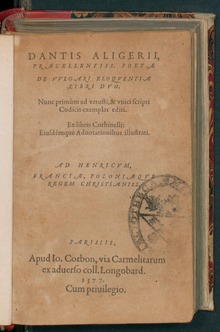De vulgari eloquentia
De vulgari eloquentia ( lat : about eloquence in the vernacular ) is a work of the Italian poet Dante Alighieri . It was written in four books between 1303 and 1305, of which only the first volume is complete and the second volume up to the 14th chapter has survived. De vulgari eloquentia is primarily concerned with the languages now known as Romance . Since Dante was addressing not only Italian but all European scholars, he wrote the book in Latin. The main topic is the question of an appropriate literary language .
content
At the beginning the author deals with the origin of the language: The tower of Babel confused the languages, but the Hebrew word for "God" can be assumed for Adam's first word. The creature must have seen its maker. Then Dante analyzes the languages of his time: He divides the spoken Romance varieties into the lingua d'oc (spoken in southern France ), the lingua d'oïl (spoken in northern France ) and the lingua del sì (predecessor of Italian ). He also knows a group with the affirmative particle iò , including German, English, Saxon, Hungarian and the Slavic languages. The third group is Greek. He declares Latin or "grammar" as well as ancient Greek to be languages that were not spoken in historical times. These languages were constructed and fixed for the purpose of tradition, so that they could also be read by posterity due to their immutability.
The lingua del sì divides Dante into 14 dialect groups; In his opinion, however, none of these were suitable for writing and poetry because they were too different from one another. There is no political center that enables the formation of a unified volgare , a unified language.
Dante then examines the poetry styles of his time. He distinguishes between three types: the stilus comicus , which addresses the educated people, the stilus tragicus for an upscale audience and the stilus elegiacus for the common people.
meaning
The work is an early testimony to the debate about the search for an Italian written language, which was not intensified until the 16th century. Even if the work contains many assumptions that are no longer valid from the point of view of today's linguistics , contemporary perspectives on the relationship between Latin and the Romance languages have been passed down through Dante. In addition, he was one of the first to combine the unity of the people with the unification of language.
Translations
- About the vernacular , KL Kannegießer, Leipzig 1845
- On poetry in the mother tongue , F. Dornseiff and J. Balogh, Darmstadt 1925
- De vulgari eloquentia , Claudio Marazzini and Concetto del Popolo, Milan 1990, Latin-Italian.
- De vulgari eloquentia: with the Italian translation by Gian Giorgio Trissino (1529) , M. Frings and J. Kramer, Stuttgart 2007, Latin-Italian-German.
- About eloquence in the vernacular , Francis Cheneval, with an introduction by Ruedi Imbach and Irène Rosier-Catach and a commentary by Ruedi Imbach and Tiziana Suarez-Nani, Meiner, Hamburg 2007, Latin-German, ISBN 978-3-7873 -1126-2 .
Web links
- De vulgari eloquentia , full text at www.liberliber.it
- De Vulgari Eloquentia - Concordances from the original text
Individual evidence
- ↑ Klein, Hans-Wilhelm (1957): Latin and Volgare in Italy: a contribution to the history of the Italian national language (= Munich Romance works 12). Munich: Hueber.

